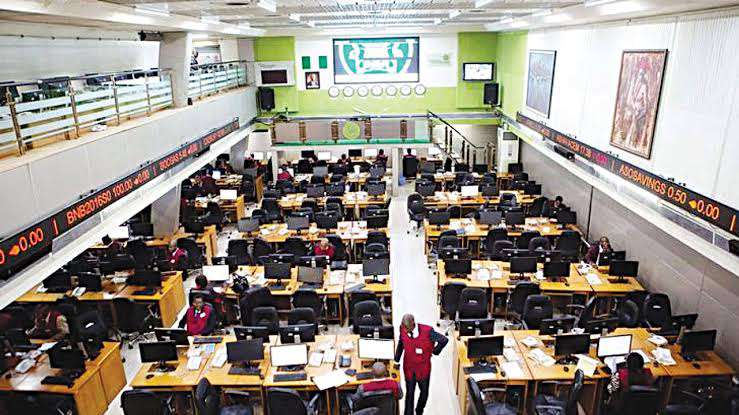Business
Anxiety over rapid bullish Market… It’s not a bubble – Analysts

The Nigerian capital market continues its remarkable growth, with the NGX All-Share Index surging to unprecedented heights. This has left investors both exhilarated and anxious about the sustainability of current valuations.
Trading at 132,381 points as of July 23, 2025, and inching close to the 135,000 mark, the index has delivered extraordinary returns of 31.90% compared to the same period last year, while posting impressive monthly gains of 10.51%.
This strong performance has pushed the market capitalization to approximately N85.1 trillion, representing a dramatic transformation of one of Africa’s largest economies’ financial landscape. However, as euphoria grips trading floors across Lagos, Port Harcourt, and Abuja, seasoned analysts maintain that the current bull run reflects fundamental economic improvements rather than speculative excess, dismissing bubble concerns as premature.
Record-Breaking First Half Performance
The Nigerian stock market closed the first half of 2025 with a spectacular 16.57% gain, marking the sixth consecutive positive first-half performance since 2020. This consistent trajectory has reinforced investor confidence and demonstrated the market’s resilience in the face of global economic uncertainties and domestic challenges.
The sustained growth pattern distinguishes the current rally from previous market bubbles, which typically exhibited volatile, unsustainable price movements driven by speculation rather than underlying value creation.
Market participants point to the broad-based nature of the gains, with multiple sectors contributing to the overall performance rather than a narrow concentration in specific stocks or industries.
Trading volumes have remained robust throughout the period, with daily turnover frequently exceeding N8 billion, indicating genuine investor interest rather than artificial price manipulation. The diversity of market participants, ranging from institutional investors to retail traders, has created a more stable foundation for sustained growth.
Banking Sector Transformation Drives Growth
The most significant driver of market performance has been the banking sector’s remarkable transformation. Nigerian banks have experienced a tripling of their collective market capitalization from N3.2 trillion in 2020 to N10.5 trillion by 2025, representing a growth of 224%over six years.
This expansion stems primarily from the Central Bank of Nigeria’s strategic recapitalization program, which sparked heightened investor interest in banking stocks throughout the first quarter of 2025. The banking sector posted a 6.96% increase during Q1 2025 alone, as financial institutions collectively raised approximately N2.4 trillion in fresh capital.
“The banking sector recapitalization represents the most significant structural reform in Nigeria’s financial sector in over a decade,” explained a senior investment banker who pleaded anonymity. “This isn’t speculative capital raising—these banks are positioning themselves for genuine business expansion, digital transformation, and increased lending capacity. The market is correctly pricing in the long-term value creation potential.”
Access Corporation (ACCESSCORP) exemplifies this transformation, with its market capitalization reaching N1.23 trillion and posting weekly gains of 5.45% in recent trading sessions. The institution’s aggressive expansion into digital banking services and strategic acquisitions across West Africa has positioned it as a continental financial powerhouse.
The recapitalization drive has also enhanced the sector’s stability, with improved capital adequacy ratios and strengthened balance sheets providing a solid foundation for sustained growth. Banks are now better positioned to support Nigeria’s economic development through increased lending to the real sector, particularly in agriculture, manufacturing, and technology.
Digital Innovation and Fintech Integration
Nigerian banks’ embrace of digital transformation has created sustainable competitive advantages that justify elevated valuations. The integration of artificial intelligence, blockchain technology, and mobile banking platforms has significantly reduced operational costs while expanding customer reach across Nigeria’s vast population of over 220 million people.
Digital payment innovations have revolutionized the financial landscape, with mobile money transactions increasing by over 150% year-over-year. This digital revolution has created new revenue streams for traditional banks while enabling them to serve previously unbanked populations in rural areas.
The fintech sector’s rapid growth has created symbiotic relationships with established banks rather than pure competition. Strategic partnerships between traditional financial institutions and fintech startups have accelerated innovation while providing banks with technological capabilities that would have taken years to develop internally.
Sectoral Performance and Market Breadth
Beyond banking, multiple sectors have contributed to the market’s stellar performance. The consumer goods sector has benefited from Nigeria’s growing middle class and increased domestic consumption, while telecommunications companies continue to expand network coverage and introduce 5G services across major urban centers.
The oil and gas sector, despite global energy transition concerns, has shown resilience through strategic positioning in natural gas exports and renewable energy investments. Major players like Dangote Petroleum Refinery have begun contributing to local refining capacity, reducing Nigeria’s dependence on imported petroleum products.
Agricultural commodities companies have experienced significant growth due to government policies promoting food security and export diversification. The sector’s performance reflects genuine productivity improvements rather than speculative trading, with companies investing in modern farming techniques and processing facilities.
Industrial goods manufacturers have benefited from infrastructure development projects and increased domestic demand for construction materials. The sector’s growth correlates directly with Nigeria’s urbanization trends and government investment in transportation and housing projects.
“What we’re witnessing is a broad-based economic transformation that’s being correctly reflected in market valuations,” noted Mr. David Adonri, Vice Chairman of the Board at HighCap Securities Limited. “This isn’t a narrow tech bubble or single-sector euphoria. We’re seeing fundamental improvements across banking, consumer goods, telecommunications, and manufacturing. When you have this kind of sectoral diversity driving growth, it’s typically sustainable rather than speculative.”
Macroeconomic Fundamentals Supporting Growth
Nigeria’s macroeconomic indicators provide substantial support for current market valuations. Inflation, while still elevated at approximately 22%, has shown signs of moderation from peak levels experienced in 2023. The Central Bank of Nigeria’s monetary policy stance has struck a balance between controlling inflation and supporting economic growth.
The naira’s exchange rate has stabilized following the unification of foreign exchange markets, eliminating the multiple exchange rate regime that previously created market distortions. This policy reform has improved transparency and encouraged foreign investment in Nigerian assets.
Foreign exchange reserves have remained relatively stable, providing confidence in the currency’s stability and the central bank’s ability to meet international obligations. The improved policy environment has attracted increased foreign portfolio investment, contributing to market liquidity and depth.
Government fiscal reforms, including improvements in tax collection efficiency and reduction in fuel subsidies, have enhanced the country’s fiscal position. These structural adjustments, while sometimes painful in the short term, have created a more sustainable economic foundation that supports long-term market growth.
Addressing Bubble Concerns
Critics of the current market environment point to several concerning factors that echo previous bubble periods. Some individual stocks trade at price-to-earnings ratios that appear disconnected from historical norms, particularly in the technology and consumer goods sectors.
Market concentration in banking stocks raises concerns about systemic risk, with the sector now representing a disproportionate share of total market capitalization. Any significant correction in banking valuations could have cascading effects across the broader market.
The surge in retail investor participation, facilitated by online trading platforms and social media investment communities, has created pockets of speculative activity reminiscent of global meme stock phenomena. Some stocks have experienced dramatic price swings based on social media sentiment rather than fundamental analysis.
Additionally, the correlation between market performance and political developments remains high, creating potential volatility around election cycles and policy announcements. This political sensitivity suggests that current valuations may partially reflect optimistic expectations about future policy directions rather than current economic realities.
However, market veterans argue these concerns, while legitimate, don’t constitute evidence of a systemic bubble. The presence of strong regulatory oversight from the Securities and Exchange Commission and the Nigerian Exchange Limited provides important safeguards against excessive speculation.
International Context and Regional Leadership
Nigeria’s market performance has outpaced most African exchanges, reinforcing its position as one of the continent’s largest economies and most important capital market. The country’s market capitalization of approximately $45 billion positions it favorably within emerging market indices and attracts international institutional investment.
Regional integration initiatives, including the African Continental Free Trade Agreement, have created additional growth opportunities for Nigerian companies seeking to expand across Africa. The country’s large domestic market provides a strong foundation for companies to build scale before pursuing continental expansion.
Foreign investor interest has increased significantly, with international fund managers recognizing Nigeria’s potential as a long-term growth story. This foreign participation has brought additional capital and expertise while improving market infrastructure and corporate governance standards.
The country’s young demographic profile, with over 60% of the population under 30 years old, provides a substantial consumer base for companies across various sectors. This demographic dividend supports long-term growth prospects that justify elevated market valuations.
Risk Factors and Potential Challenges
Despite the positive fundamentals, several risk factors could impact market performance. Security challenges in certain regions continue to affect business operations and investor confidence, particularly in the agricultural and mining sectors.
Infrastructure limitations, including power supply and transportation networks, remain constraints on economic growth and corporate profitability. While government investment in infrastructure continues, the pace of improvement may not match market expectations.
Global economic conditions, including potential recession in major economies, could affect demand for Nigerian exports and reduce foreign investment flows. The country’s continued dependence on oil revenues, despite diversification efforts, creates vulnerability to commodity price volatility.
Regulatory changes, while generally supportive of market development, could create short-term disruptions as companies adapt to new requirements. The ongoing implementation of various economic reforms requires careful management to avoid unintended negative consequences.
“Every emerging market faces challenges, and Nigeria is no exception,” acknowledged Mike Ezeh, MD/CEO, Crane Securities Ltd.
“The key question is whether these challenges are manageable within the context of the country’s overall growth trajectory. Based on current evidence, the positive fundamentals significantly outweigh the risk factors, supporting continued market appreciation at a more moderate pace.”
Looking Ahead: Sustainable Growth Trajectory
Most analysts expect the Nigerian market to continue its upward trajectory, albeit potentially at a more measured pace than the dramatic gains of recent months. Corporate earnings growth is projected to moderate to sustainable 15-20% annual rates, while stock price appreciation may align more closely with these fundamental improvements.
The ongoing digital transformation across sectors is expected to drive productivity improvements and cost reductions that will translate into enhanced profitability. Companies that successfully implement technological solutions while maintaining operational excellence are likely to outperform those that fail to adapt.
Banking sector performance will remain crucial to overall market direction, with successful completion of recapitalization programs and effective deployment of new capital determining long-term sustainability. The sector’s ability to increase lending while maintaining asset quality will be critical for continued investor confidence.
As the Nigerian capital market continues its remarkable journey, investor anxiety about current valuations is both natural and healthy. However, the evidence suggests that current market levels, while elevated, reflect genuine economic improvements and structural reforms rather than speculative excess. The challenge for investors remains identifying companies with sustainable competitive advantages while avoiding those that may be temporarily benefiting from market enthusiasm without underlying operational improvements.
The bull market’s continuation will ultimately depend on companies’ ability to translate economic opportunities into sustained profit growth—a test that will separate genuine value creators from temporary beneficiaries of market optimism. With strong fundamentals supporting current valuations, Nigeria’s capital market appears positioned for continued long-term growth, provided that structural reforms continue and macroeconomic stability is maintained.












